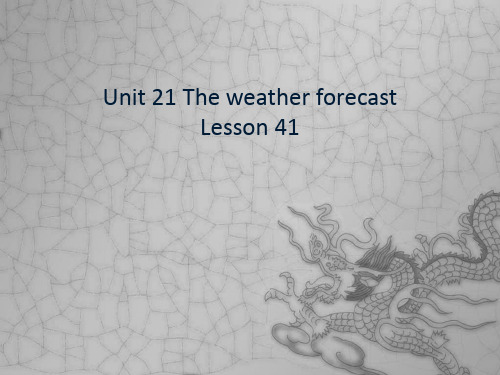青少版新概念Unit 21 新概念2第21课解析
- 格式:ppt
- 大小:1.09 MB
- 文档页数:18

新概念第二册21课第一篇:新概念第二册21课21课上课时间:上课地点:教学用书:新概念二教学目标: 掌握生词和短语①mad,reason,sum,② be mad about/on sth,the reason for sth …理由教学重难点:①determine on sth 决定做某事/determine to do sth ②表“许多”的短语:如a great many + pl.a number of + pl.③come into use,关于knock的短语教学过程:New words and expressions 1.mad adj.发疯的①be mad 发疯,发狂(强调状态)go mad 发疯,发狂(强调转变)drive sb mad 逼疯②be mad about/on sth对…疯狂的,狂热的He is mad on football 他对足球狂热。
2.reason 1)n.原因for this reason 由于这个原因for some resson 由于某个原因(some: 某一个,加可数名词单数)give a reason 提出理由the root reason 根本原因the reason is that… 理由是…the reason why…is that… …的理由是…eg.The reason why I study English is that I envy those who speak English well.我学习英语的理由是我羡慕那些讲英语很好的人。
the reason for sth …理由eg.What’s the reason for your absence? 你缺席的理由是什么?the reason to do sth 做某事的理由eg.Is there any reason to go there? 有去那儿的理由吗? 2)理性,正常心智eg.Only man has reason.只有人类才有理性。

新概念英语第二册课后习题答案详解Lesson 11. b选b最为正确。
因为a.d.都与课文内容不符合,也不合乎逻辑;c.的意思是“他们没有注意他”,而作者的意图并不是想让他们注意他,而是想让他们停止谈话。
所以选b. 最能表达作者当时心里的感受。
2.c其余3个答案都与原句意思不符合。
3.b因为a. to 不对,可以是He went to the theatre;c. into 也不对,可以是He went into the theatre;d. on更不符合语法,表示在某一个地方用介词in 或at, in 表示在大的空间,如国家,城市等,at 则表示在小的地点或空间,如atthe office, at the theatre 等, 所以选b.是正确的。
4.db. above(在……上方);c. ahead of (在……的前面,在……之前)不和behind 对应,也不强调位置的前后顺序。
a. before 和 d. infront of 都是和behind对应的,都有“在……前面”的意思。
但in front of 更具体的强调位置,而before则包含更宽泛的意思,即时间上,空间,次序,登记,重要性方面的“在……前面”5.c因为用 a. Where, b. why, d. when 提问都不符合逻辑,都不是针对状态提问的,只有How提问,才能用Angry回答。
6.ab. they 只做主语;c. their只能做定语;d. us 虽然可以做宾语,但与前一句意思不符合。
7.da. none是代词,很少用在名词前面;b. any 只能用在否定句或疑问句中;c. not any 不符合语法,因为前面没有助动词did.8.ba. chair(椅子), c. armchair(手扶椅) d. class(班级) 这3个选择都和seat的意思不符合。
Seat是”座位,座席”的意思。
强调的是可供坐下的地方,不是具体的椅子。




Unit 21 The weather forecast 天气预报一、重点单词及拓展:1.rain 名词,雨;动词,下雨(普通动词,有时态的变化)1)不可数名词,雨例:There will be rain tomorrow. 明天将有雨。
2)动词,下雨三单rains, 现在分词raining, 过去式rained例:It will rain tomorrow. 明天将下雨。
It is raining heavily now. 现在雨下得很大。
3)rainy形容词,多雨的,阴雨的例:It is always rainy in Tianjin in July . 在天津,7月份总是多雨。
补充:snow(名词,雪;动词,下雪,和rain 用法相同)2.rise和raise的区别1)rise 不及物动词(vi),后面不能直接接宾语,意思是升起、上升、起床等,过去式为rose。
rise也可以做名词使用,表示上涨、提升等意思。
例:The sun rises in the east. 太阳从东方升起。
My parents rise very early. 我父母起床很早。
2)raise及物动词(vt),后可直接接宾语,意思是举起、升起、增加、饲养等,过去式为raised。
例:He raised his voice. 他提高了嗓音。
I can’t raise the box. 我举不起这个箱子。
He is a farmer and raises horses. 他是农民, 同时又养马。
拓展短语:raise one’s hand举起手raise one’s hat 脱帽致意raise one’s voice 提高嗓门raise a family 养家糊口造句练习1:1)昨晚下了一夜的雨。
2)夏天是个多雨的季节。
你要随时准备好雨伞。
3)当太阳升起的时候,人们会感到温暖。
4)请先举手,再回答这个问题。
3.bring 动词,带来;引起;导致过去式为brought1)带来,通常指把人或事物带到讲话人或听话人所在之处,对应词为take(拿走)例:Did you bring my book this time? 你这次有把我的书带来吗?结构:bring+人/物to...例:She brought her friend to the party. 她带着朋友来参加聚会。